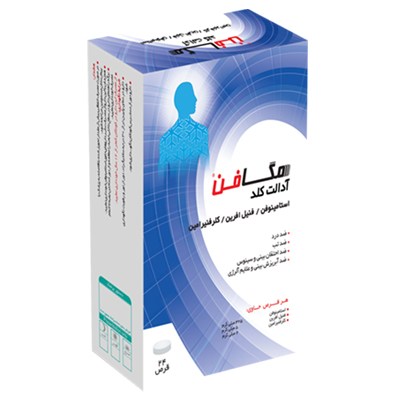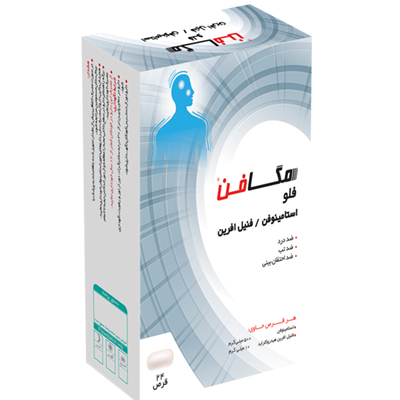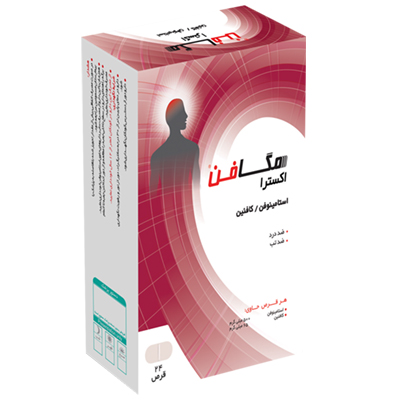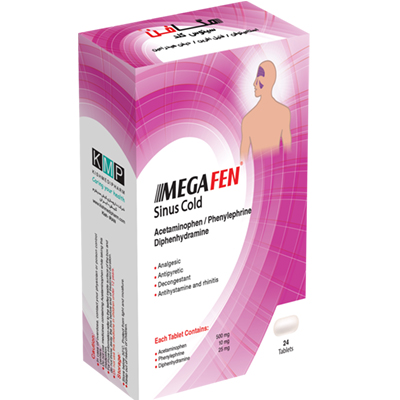Choosing the best ointment for neck pain requires an examination and tests performed by a specialist to determine the cause of this type of pain. There are also other factors that are important in choosing the type of treatment for neck pain, some of which we will discuss below:
- Pain level: If the pain is mild, quick treatment for neck pain may be possible with a pain reliever such as Megafen Pain, which contains acetaminophen, caffeine, and ibuprofen. For mild pain, other pain relievers are used systemically (oral) or topically. If the neck pain is severe, one of the best ointments for neck pain is appropriate.
- Drug interactions: If you choose a topical ointment or cream for quick relief of neck pain, don't assume that you won't experience drug interactions with systemic medications. Some topical medications can also cause unwanted side effects, so it's important to consult a pharmacist.
- Cause of neck pain: If your neck pain is caused by a strain or muscle strain in your neck, applying a topical ointment to the area of pain can go a long way in treating neck pain. Pain caused by inflammation can be significantly helped by applying a topical anti-inflammatory ointment.
- Allergy history: Before buying any oral or topical medication, you need to make sure that you are not allergic to the ingredients of that medication. The allergy test for topical products is to apply a thin layer of ointment or cream on the back of your hand. If it does not become red and inflamed, it means that you are not allergic to that product. If you are not allergic, diclofenac ointment is also considered one of the best ointments for neck pain.
- Special conditions: If you have an underlying medical condition, are planning to become pregnant, are breastfeeding, or are pregnant, be sure to consult your doctor before taking any medication.
What is a symptom of neck pain?
The cause of neck pain can be very diverse and different, correctly diagnosing this issue is the first step to treating neck pain. In many cases, sleeping incorrectly, injury and physical impact to the neck area can cause neck pain, but you should remember, if the pain becomes chronic and long-lasting, you should definitely see a specialist to identify the cause of neck pain. Below we will mention the most common causes of neck pain:
- Having diseases including autoimmune, thyroid, seasonal rheumatism, meningitis, fibromyalgia, rheumatic fever, heart and digestive problems, infections in the gum and teeth area
- Excessive and improper use of electronic devices such as laptops, mobile phones, computers, televisions, and incorrect sitting.
- Nervous stress and anxiety, nervous tension and mental pressure
- Exercising in an unprincipled and harmful manner
- Damage to the intervertebral discs
- Tendonitis and bursitis inflammations
- Stretched ligaments and muscles
- Neck muscle imbalance
- Narrowing of the spinal canal
- Decreased physical activity
- Inappropriate pillows
- Cervical disc herniation
- Neck osteoarthritis
Remember that diagnosing the cause of neck pain is entirely the responsibility of a specialist, and you should avoid arbitrary treatments.
Ways to treat neck pain
It is best to have your neck pain treated by your doctor, but the most common treatments include home remedies, medication, specialist treatments, and surgery. Below, we will look at some of the most effective immediate treatments for neck pain.
Treating neck pain with 5 home remedies
If the severity of your neck muscle spasm is mild, you can try one of the home remedies for neck pain, if diagnosed by your doctor. The most common home remedies are:
- Hot water bottle or hot shower: Using these two methods can help relax the muscles and subsequently treat neck muscle spasms.
- Light sports: Treat neck stiffness by gently rotating your neck from side to side and exercising it every few minutes. Strengthening your neck muscles over time can be an effective way to treat neck pain. Another effective way to improve this condition is to sit comfortably and roll your shoulders back. Clasp your hands gently behind your head. Press your head firmly back in your hands. Hold for 30 seconds and release.
- Correction of sitting and walking pattern: Many neck pains are caused by sitting in the wrong way, especially behind a computer or on a sofa. Therefore, it is better to help treat neck pain by correcting your sitting and walking style. Keep your shoulders aligned with your ears so that the weight of your head does not rest on your neck, because the weight of your head should be on your spine.
- Using the right pillow: Many neck pains are caused by sleeping on hard and unsuitable pillows. To help treat the resulting neck pain, use medical and appropriate pillows.
- Reduce stress and anxiety: If you are experiencing severe anxiety and stress, it is better to use a method like yoga. Stress causes muscle contractions, which leads to pain in various parts of the body, including the neck. Therefore, being relaxed helps treat neck pain caused by stress.
Treating neck pain with specialized surgical methods
Neck surgeries are performed to treat a variety of problems that may include serious complications or reduced quality of life. This type of neck pain treatment is recommended under the supervision of a specialist doctor with multiple examinations. Some of these quick ways to treat neck pain include the following:
- Spinal canal evacuation surgery (Decompression Surgery)
- Intervertebral disc surgery
- Osteotoplasty (Vertebroplasty)
- Laminoplasty
- Laminectomy
- Disc herniation (Discectomy)
Drug therapy, immediate treatment for neck pain
One of the immediate treatments for neck pain is medication. Although only a specialist can diagnose this condition, if you suspect that the pain is not due to a serious cause, one of the following may help:
- Use of topical nonsteroidal anti-inflammatory ointments (ibuprofen, naproxen, diclofenac)
- Neck warmers (capsaicin and hot pepper cream)
- Painkiller ointments (lidocaine)
- Sedatives (methocarbamol)
Home remedies, drug therapy, and specialized neck surgeries are some of the ways to treat neck pain that are performed upon specialist diagnosis.
Comparison of the types of ointments suitable for relieving neck pain
Repairing ointments are among the important products in skin care and wound healing. These products, with their special ingredients, help in the process of repairing and healing damaged skin. There are various reasons for neck pain, and depending on the cause, various medications or treatments can help.
Self-treatment can be dangerous, so diagnosing and choosing the best ointment for neck pain definitely requires a prescription from your specialist and treating physician. The types of best ointment for neck pain that are widely used include the following:
- Diclofenac ointment Kish Medipharm
- Avocado or cocoa oil ointment
- Ointment Calendula Assassin مدیفارم
- Ointment Rosemary Assassin مدیفارم
- Silversulfadiazine ointment
- Methyl salicylate ointment
- Peppermint oil ointment
- Flaxseed oil ointment
- Piroxicam ointment
- Capsaicin ointment
- Eucalyptus ointment
- Ibuprofen ointment
- Ketoprofen ointment
- Aloe vera ointment
- Thyme ointment
- Clove ointment
Now that you know the different types of the best ointment for neck pain, it's best to know what ingredients are used in these products. Below, we have listed some of the features that a topical pain-relieving product should have:
- Anti-inflammatory (diclofenac)
- Painkillers (menthol, caffeine, and ibuprofen)
- Cooling properties (menthol and camphor)
- Has warming properties (capsaicin)
- Muscle relaxants (camphor, guaifenesin, and menthol)
The best ointments for neck pain include diclofenac and rosemary. These products have anti-inflammatory and soothing properties.
Diclofenac ointment is the first choice as the best ointment for neck pain.
Diclofenac ointment is one of the most widely used and effective topical medications for reducing pain and inflammation. This ointment, which contains the active ingredient diclofenac sodium, belongs to the group of nonsteroidal anti-inflammatory drugs (NSAIDs). This product is known as the best ointment for neck pain due to its advantages such as low price, easy access, and fast effect.
Diclofenac ointment from Kish Medipharm can be used to relieve pain caused by muscle injuries, arthritis, and neck pain. Diclofenac works by inhibiting the enzyme cyclooxygenase (COX), which is responsible for the production of prostaglandins (substances that cause inflammation and pain). By reducing the production of prostaglandins, inflammation and pain are also reduced. Topical application of this ointment provides anti-inflammatory and analgesic effects directly to the target area.
How to use diclofenac ointment is as follows:
- Washing hands and the painful area: First, wash your hands and the area where the ointment is to be applied with soap and water and dry it.
- Using the right amount of ointment: Apply a small amount of ointment (usually the size of a pea) to the painful area.
- Repeated use: Repeat this usually 2 to 3 times a day, or as directed by your doctor.
- Gentle massage: Gently massage the ointment into the skin until it is completely absorbed.
Kish Medipharm Diclofenac Ointment is considered the best ointment for neck pain, with its anti-inflammatory properties.
The role of rosemary ointment in the rapid treatment of neck pain
Rosemary ointment is one of the natural and effective remedies for relieving muscle and joint pain. This ointment contains rosemary extract, which has anti-inflammatory, analgesic, and antispasmodic properties.
Medipharm Kish Rosemary Ointment is an effective and natural option for treating neck pain and inflammation caused by neck pain and other muscle and joint problems. With proper and regular use of this ointment, you can achieve faster recovery and reduce discomfort caused by neck pain. Below, we will discuss the features of rosemary ointment that provide immediate treatment for neck pain:
- Pain reliever: The rosemary herb used in the product has analgesic properties that help reduce muscle and joint pain. This ointment can be effective for the immediate treatment of neck pain caused by trauma.
- Increased blood flow: Another important property of rosemary is that it increases blood flow to the area used. This can help speed up the healing process and treat stiff neck pain.
- Antispasmodic: Rosemary ointment can help reduce neck stiffness and muscle tension. This property is especially beneficial for people who suffer from muscle spasms or long-term tension.
- Antioxidant: Rosemary contains powerful antioxidants like carnosol and rosmarinic acid, which can help reduce oxidative stress and protect cells from damage caused by free radicals.
- Cooling and soothing: The cooling and soothing feeling that comes after using rosemary ointment can help soothe and comfort the skin, muscles, and quickly treat neck pain.
Medipharm Kish Rosemary Ointment has anti-inflammatory, cooling, antioxidant, antispasmodic, and blood flow-increasing properties and has been recognized as a quick treatment for neck pain.
Frequently asked questions about immediate neck pain treatment
Through our research and investigation, we found that many of the common questions that the general public asks pharmacists when purchasing and preparing various painkillers to treat neck pain are as follows:
What does topical pain relief mean for treating neck pain?
Topical medications are products that are applied to the surface of the skin. The advantages of these medications for the immediate treatment of neck pain include: ease of use, combination use with systemic medications for the immediate treatment of neck pain, faster effect, and minimal systemic side effects. Topical medications are produced in the form of creams, ointments, lotions, gels, and sprays.
Remember not to cover the surface of topical medications in any way, as this will increase their absorption into the bloodstream and may cause unwanted side effects. According to research, topical painkillers can help treat neck pain up to 50% faster.
How long does it take for neck muscle cramps to go away after using topical painkillers?
The effectiveness, duration, and duration of the medications vary, and you should be aware of these by carefully reading the brochure. Since topical painkillers provide immediate relief from neck pain, they usually start to work after 30 to 60 minutes.
When should I see a specialist after taking painkillers?
If your pain does not go away after a few days or if it gets worse, stop using the ointment and talk to your doctor. Also, if you experience skin allergies or shortness of breath with any topical neck pain medication, inform your doctor immediately so that he or she can recommend an alternative medication if needed.
Conclusion
If you don't know what is causing your neck pain, you should see a specialist right away because the treatment for neck pain depends a lot on its cause and severity. People with neck pain use home remedies, medication, and surgery to treat their neck pain. The choice of these methods is entirely up to your doctor's advice and prescription.
One of the best ways to immediately treat neck pain is to use topical ointments. The best ointments for neck pain are diclofenac and rosemary, which, with their special properties, can greatly help reduce this type of pain.
Remember, all of the recommendations announced are solely intended to raise public awareness and provide assistance to your loved ones, and cannot in any way replace the advice of your physician.
The items stated in the articles are general and are not written with regard to the individual's physical health conditions. One of the most important things to pay special attention to during treatment is the use of current medications. The medications recommended here may interact with one of your medications and cause unwanted problems.




